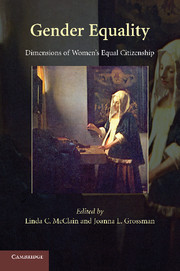Book contents
- Frontmatter
- Contents
- Contributors
- Acknowledgments
- Gender Equality
- Introduction
- PART I CONSTITUTIONAL CITIZENSHIP AND GENDER
- PART II POLITICAL CITIZENSHIP AND GENDER
- PART III SOCIAL CITIZENSHIP AND GENDER
- PART IV SEXUAL AND REPRODUCTIVE CITIZENSHIP
- 13 Sexual Citizens: Freedom, Vibrators, and Belonging
- 14 Feminism, Queer Theory, and Sexual Citizenship
- 15 Infertility, Social Justice, and Equal Citizenship
- 16 Reproductive Rights and the Reproduction of Gender
- PART V GLOBAL CITIZENSHIP AND GENDER
- Suggested Readings
- Index
- References
16 - Reproductive Rights and the Reproduction of Gender
Published online by Cambridge University Press: 05 August 2012
- Frontmatter
- Contents
- Contributors
- Acknowledgments
- Gender Equality
- Introduction
- PART I CONSTITUTIONAL CITIZENSHIP AND GENDER
- PART II POLITICAL CITIZENSHIP AND GENDER
- PART III SOCIAL CITIZENSHIP AND GENDER
- PART IV SEXUAL AND REPRODUCTIVE CITIZENSHIP
- 13 Sexual Citizens: Freedom, Vibrators, and Belonging
- 14 Feminism, Queer Theory, and Sexual Citizenship
- 15 Infertility, Social Justice, and Equal Citizenship
- 16 Reproductive Rights and the Reproduction of Gender
- PART V GLOBAL CITIZENSHIP AND GENDER
- Suggested Readings
- Index
- References
Summary
Women's citizenship rights, that is, their rights to participate in social, economic, cultural, and political life on equal terms with men, are explicitly guaranteed in the Convention on the Elimination of All Forms of Discrimination Against Women (CEDAW, or the “Women's Convention”). These rights include the civil and political rights familiar to Americans from our own Constitution such as freedom of expression and freedom of association. These rights also include less familiar economic and social rights such as the right to work and the right to health. Under CEDAW, these rights are to be ensured in fact as well as in law. This means that CEDAW unequivocally bars what I refer to here as the reproduction of gender, that is, the perpetuation of gendered stereotypes. These include both the stereotype of “citizens” as male, never pregnant, never breast-feeding, and the stereotype of women as exclusive caregivers, always subject to the endless demands of caregiving, even if not actually pregnant or breast-feeding. Rather, under CEDAW, men are expected to assume caregiving responsibilities, and the state is expected to encourage them to do so.
Reproductive rights, including the right to decide when and whether to bear children, are a key component of the citizenship rights of women. Historically, however, reproduction has been viewed as a key component of women's duties as citizens. As Aristotle pointed out, women reproduce citizens, not only in the sense of rearing and raising them, but quite literally by producing them.
- Type
- Chapter
- Information
- Gender EqualityDimensions of Women's Equal Citizenship, pp. 345 - 356Publisher: Cambridge University PressPrint publication year: 2009
References
- 2
- Cited by



